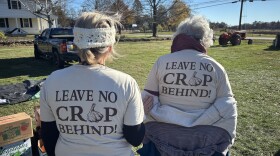Studies show that growing up below the poverty line can have serious health implications, but can it have a lasting effect on the brain? On today’s show we continue NHPR’s series The First Decade by examining scarcity and how it can hijack a person’s neural pathways, affecting a child’s decision making later in life.
Then, a look at a technological issue that is threatening the livelihoods of farmers across the U.S. how the increasingly computerized nature of automobiles – and a far-reaching copyright law – is preventing farmers from maintaining their own equipment.
Listen to the full show
The First Decade: How Scarcity Can Hijack the Brain
Eldar Shafir is Professor of Psychology and Public Affairs at Princeton University, where he studies human behavior and decision making in the context of poverty. He is co-author of the book Scarcity: Why Having Too Little Means So Much.
Strict Copyright Laws Are Changing The Nature of Vehicle Ownership
Kyle Wiens is the founder of iFixit, an online community that creates and shares free repair guides. He’s also a contributor to Wired magazine, where he recently penned a scathing op-ed entitled “We Can’t Let John Deere Destroy The Very Idea Of Ownership.”
Behind The Scenes on a Pot Farm in Mendocino
Federally, marijuana production can still result in decades in prison. Yet in Northern California, there’s a whole economy built around it. They call the area the “Emerald Triangle” – marked by Humboldt, Trinity and Mendocino counties. In Mendocino specifically, the gradual decline of the lumber industry led to marijuana becoming one of the county’s major commercial crops over the last decade. Cultivating and selling marijuana for medical use is legal in Mendocino County, but of course there is a grey area when it comes to federal law, and how much you grow. KALW’s Daphne Matziaraki spent a day behind the scenes on a pot farm in Mendocino to find out how it all works.
You can listen to this story again at PRX.org.
Baking With Less Sugar

Can a dessert that has less sugar still taste as sweet? That was the challenge for Joanne Chang the chef owner of Boston’s Flour Bakery + Café—who also has a degree in applied mathematics and economics. Using her skills as a mathematician she re-worked some of our favorite desserts using a fraction of the sugar traditionally called for. Her third cookbook called Baking with Less Sugar.







